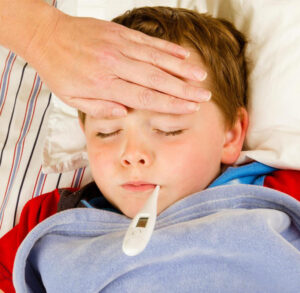
Most parents in the west have been led to believe that a fever is bad and when a baby or child gets a fever, there are appropriate ‘baby’ fever reducers that should be given. New parents are advised by doctors and nurses on how and when to give over the counter (OTC) pharmaceuticals to babies for a variety of reasons. Many parents feel that if they do NOT give their baby these ‘baby’ pharmaceutical products widely available at grocery stores and pharmacies, they are not ‘good’ parents. Because the medical profession has not understood the value of a fever, many parents have been led down a path that they didn’t expect – sometimes including longterm chronic illness.
What is fever? What is the appropriate loving response for a parent when their baby or child develops a fever?
“Giving Tylenol to a babe for fever is equivalent to shooting your own attack dog when he’s going after a home intruder! Fevers are important.”
Dr Larry Palevsky is a NYS licensed pediatrician, who utilizes a holistic approach to children’s wellness and illness. He has been promoting health naturally for decades and has discovered valuable information that he passes on to parents. The following points about fever are from his website, where you will find even more detailed explanation of the beneficial role of fever in childhood.
GENERAL GUIDANCE IF YOUR CHILD IS SICK: “Do less. Stimulate less. Speak less. Eat less.” “Drink more. Sleep more. Rest more. Breathe more.”
- Stop your daily routine and encourage your child, and your family members, to rest.
- Provide a safe and comfortable environment for your child to process the illness.
- Encourage plenty of fluids (water, tea, broth, soup, breast milk). If your child is on formula, you may need to either stop the formula completely, or feed fewer ounces through the illness.
- Turn the volume down. Reduce activity levels, noise, excitement, schedules, chores, and tasks to a minimum.
- Turn the lights down. Maintain a calm, quiet, peaceful environment for your child’s nervous system to heal.
- Stay indoors; play quiet games. Going outside can be too much of an energetic overload for your child’s body when sick, and may prolong and intensify the stress on his body.
- Give your child a warm bath, several times per day if necessary, and stay with your child as much as possible. Lay low, and watch your child closely. Be mindful of cool or cold drafts when getting out of the bath.
- Regarding supplements, it is best to stop most, if not all of the supplements that your child is taking. You will need to use your judgment in making this decision.
- Do not force your child to eat. When children are sick or not feeling well, their digestive systems slow down. Food is one of the last things children are interested in when they have a fever or don’t feel well. Just ensure fluid intake, and don’t push foods. Their bodies will tell you when they are ready to start eating again. And, most importantly, avoid sugar, including juices, flour and dairy products, and fried foods, when your child is sick, as these foods tend to increase stress, dehydration, and mucus production in the body, which will prolong, or worsen, the course of illness.
- Observe your child for mental status changes.
- Please remember that the resolution of illness can take some time. The more patience you have, the more closely you observe your child, and the more you efficiently remove the stressors in your child’s environments, the greater you will impact the length of recovery for your child’s illness.
- You may need to cancel plans, stay home, and not participate in previously planned activities so your child can rest and heal at home in her own comfortable, safe environment. The most important thing you can do as a parent is to provide your child with a safe environment in which healing can occur.
- Make the first day your child feels better a slow day. Stay home and rest for the first 24 hours that the symptoms of illness have finally abated. Try not to rush back into the daily routine of life.
Re: Acute Illness: Dr. Palevsky often remarks that “children need to be allowed to experience symptoms of acute illness in order for their bodies to appropriately cleanse the waste and toxins from their systems, and so they can go forward in their lives toward greater optimal health and wellness.” Rarely does Dr. Palevsky ever need to prescribe antibiotics for children in his practice. On average, he writes one antibiotic prescription per year. This is because he has come to understand that most illnesses in children are not caused by infections, and therefore, don’t require antibiotic treatment. Dr. Palevsky recommends that parents read this section of his website in great detail so that they can better understand and address any perceived challenges to their children’s health.
Dr Palevsky has a lot of experience and includes much more helpful information on the details of the body’s detox process on his website, including information on ear pain, coughs, diarrhea and vomiting. Many parents find it difficult to act against their strong programming of “avoiding a fever at all costs”. They may feel that their child is suffering and all they want to do is give them some relief. However, the short term difficulty of a fever will build long term health. Taking a short cut – by giving fever reducers – is actually going to adversely impact long term health. The action of Tylenol reduces glutathione in the body – an important anti-oxidant containing three amino acids that helps in the detox process. Giving Tylenol (aka acetaminophen, Paracetamol, Panadol) can result in your child being sick for longer, as well as other harmful impacts that parents are seldom warned about:
Estimates suggest 90% of infants are given Tylenol (aka acetaminophen). Pregnant women are encouraged that Tylenol is safe to take during pregnancy. Yet, there has been virtually no thorough investigation of the neurological consequences. There are 16 human studies which suggest brain developmental harm from use in pregnancy. Read more of the potential harm from this commonly used OTC treatment.
https://journeyboost.com/2020/01/22/tylenol-and-asd-adhd-were-you-warned/
I believe 99% of all parents ONLY want what is best for their children. Navigating the information and discerning what is truly best is not always easy. There are many forces competing for our attention, allegiance, and money. Every parent will benefit from tuning into their gut instincts, seeking God’s wisdom, and asking a lot of questions. Most of us were not trained in critical thinking skills in our ‘education’ and have been subjected to a lot of marketing and propaganda pushed on us as “health information.”
A wise person said, critical thinking is all about believing more true things and believing less untrue things. We will spend the rest of our lives honing these skills!
I’d love to hear your personal experience of nursing a child through fever. I’ve watched both my five children, and our nine grandchildren receive a lot of TLC when sick and bounce back quickly from most illnesses. Fever reducing meds were never a part of my home first aid kit!
Becky Hastings collects information on health and tries her best to discover and share truth. By God’s grace, through Jesus Christ, I was saved from the life of a rebel. I’ve been blessed with a husband of 41 years, and five precious babies all grown up. I now get to delight as nine grandchildren grow! Together we can help each other discover a healthy path in this crazy upside down world. Be sure to subscribe to stay in touch!

